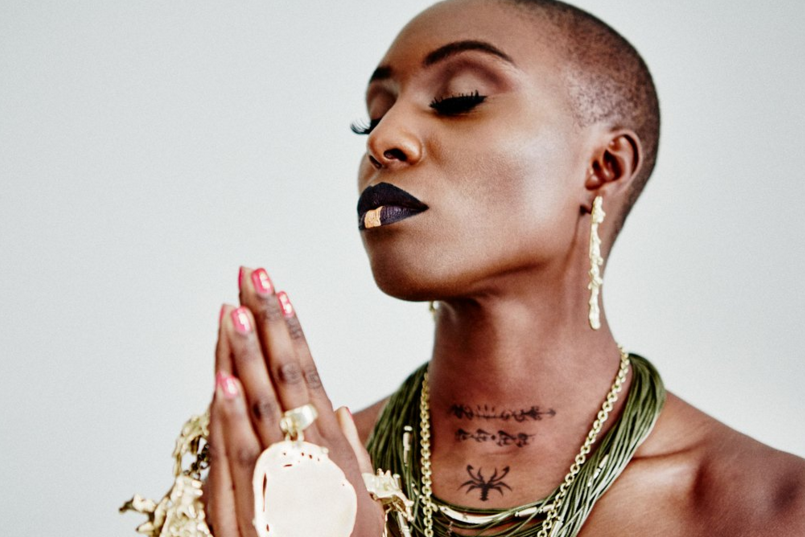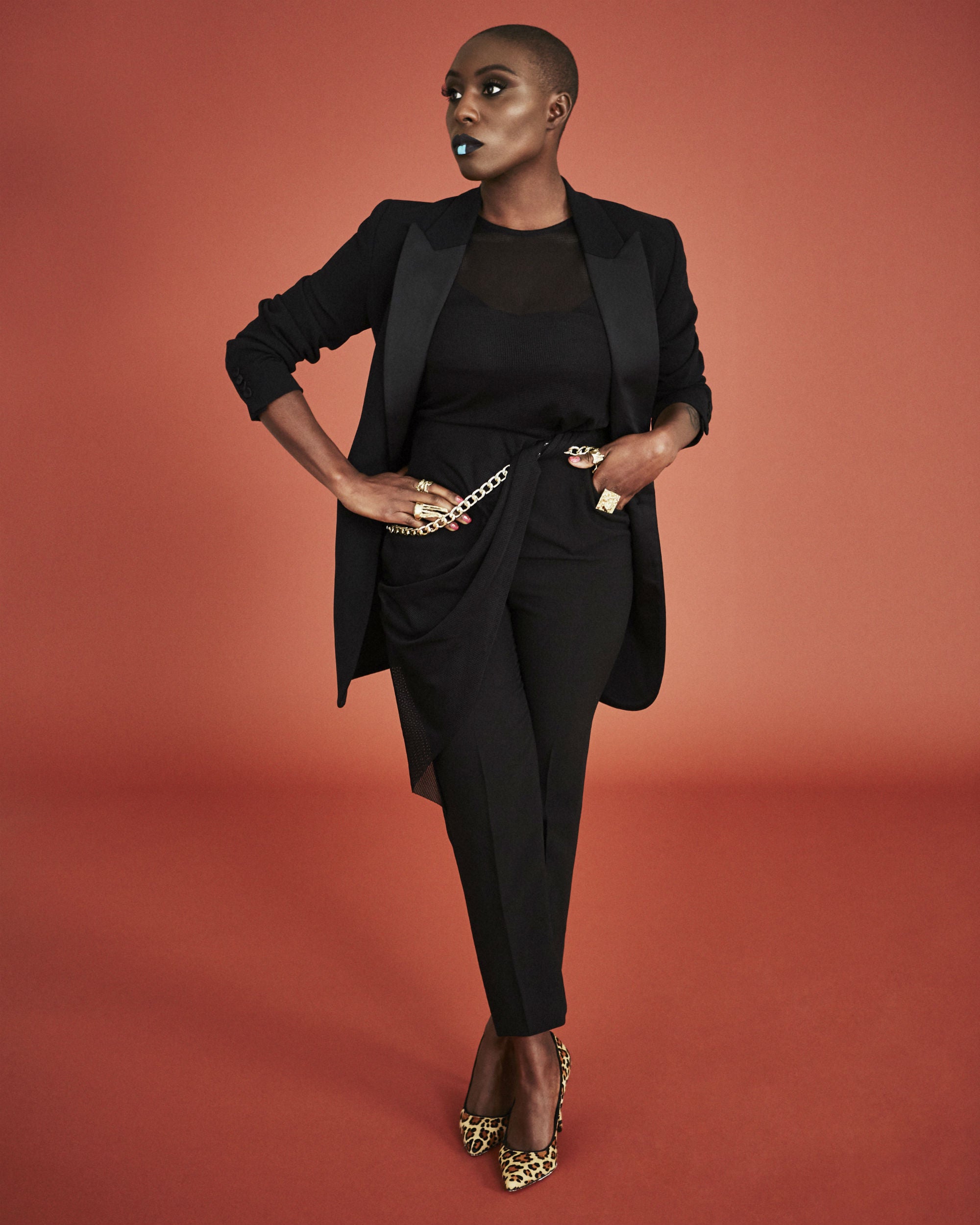Laura Mvula interview: 'I surround myself with women who celebrate everything about themselves'
The Mercury-nominated singer talks to Jess Denham about making her new album in a dark time of divorce and anxiety, "needing" Maya Angelou and the challenging journey we are on together as women

Laura Mvula makes it look easy. Her compelling, stand-out talent, dramatic fashion style and endless music industry accolades spark envy in women worldwide and her upcoming second album, The Dreaming Room, is poised to make the Mercury Prize shortlist once again. So to find out, actually, it hasn’t been easy, and that it's been an uphill struggle of the steepest kind, is a surprise. The 30-year-old singer-songwriter recently gave a profoundly personal interview revealing her draining wrestle with anxiety in the midst of a painful divorce last year. This has been a time of deep crisis for an artist who found making her acclaimed debut, Sing to the Moon, nothing but a “beautifully seamless” process of expressive creativity. She was enjoying a "purple patch" then, but life has since turned blacker.
When we meet she is sitting on a sofa in a cosy, quiet room at Sony HQ in London, dressed casually with her signature shaved head but lacking the bright, warrior-esque makeup of her latest marketing campaign. The first thing she tells me is that she is tired, before showing me the stunning visual essay she developed to accompany her new music and to help those working with her to capture a sense of authenticity. Striking photos that inspired her, mainly taken from magazines, are surrounded by scrawled snippets straight from her imagination: ‘This album will be truly dark and beautiful’, ‘Life is not clean-cut’, ‘All images must be glorious and vulnerable at once’. The last song on the tracklist is simply titled “Who I Am”. There is clearly a theme.
Mvula has always loved paper and pictures and scribbling. “There was something grown-up about it to me, as a kid,” she says in a calm, unintentionally majestic tone. “I’ve always enjoyed having something tangible that you can hold and see in front of you. It seems to be how my brain works.” A bigger sound was important to her on this album, she wanted everything to be much more stylised to make the songs come alive. “It’s a selfish thing really,” she admits. “It’s about wanting to be heard.”

The success of Sing to the Moon took Mvula, who grew up in Birmingham and was classically-trained at the conservatoire, by surprise. “I hadn’t really needed to think about things like ‘Who am I?’ and ‘Am I happy?’ before,” she says. “It all happened so fast that there wasn’t really time for me to look at the art and feel anything.” For Mvula, 2013 was a time of wearing off-white clothing and smiling a lot out of fear of coming across too menacing. “I felt strangely apologetic for the kind of music I was making because it wasn’t radio music, but I wouldn’t express any of that in that context because I was trying to get people to be okay with me existing,” she says. Soon, she found herself looking inwards and questioning what she found: “It was important for me to break out and be comfortable with being uncomfortable, which is kind of what my little life has been like until this point.”
Turning 30 has proved a “real rite of passage” for Mvula, what with “telling everybody her business and divorcing and s**t”. It’s heavy stuff, but facing herself has led to feeling more alive than ever. “It’s all gone into the music, or maybe even the music has dictated that. It started way back, from a frustrated place, because I was suddenly part of this world where people make album after album,” she says of the battle to resist the industry machine and create music on her own terms. “Nobody told me that it was this incessant treadmill thing that once you’re on, it’s hard to get off,” she continues. “I don’t have kids but I can imagine what it’s like being a mum for the first time. Your vagina’s been bust open and someone’s saying, ‘Where’s the next child?’” It’s quite the analogy, but an apt one to describe the relentless, swirling pressure that so violently filled Mvula’s head.
Prone to depression and spiralling downwards, she knew she had to find a way out. This took time, which proved a crucial part of her learning process: she began to realise the importance of being patient with herself while accepting that other people around her might not be. For someone inherently battling to quash the people-pleasing part of themselves, it was tough. “I don’t like people looking at me with accusing eyes,” she says. “I can forgive people for sometimes giving in to this pressure because there’s a whole team of people getting paid to make my album fly. If it isn’t there, they don’t have a job, but that’s a heck of a burden to bear when you’re trying to make a bit of art.”
While nobody was picking up the phone to Mvula, badgering her for new music, it was the hearsay, implications and fake smiles that troubled her the most. As someone who makes a living from her vivid imagination, she had dreamed up people outside the door with pitchforks and knives, waiting. “It was nightmarish but I believe it served me in making music that was harder to come by,” she says.
Mvula takes me back to the day she wrote breakthrough single “Green Garden”. She remembers waking up and staying in her pyjamas all day, writing the chilled, summery song and then dancing to it. From that picture of effortless joy, we travel together to an ex-boyfriend’s apartment in wintery New York, around the time of her big afro. Mvula is sitting in front of her laptop, staring hopelessly at the screen before bashing keys and making a cacophony of weird sounds with her voice. “I was reaching into the innermost parts of myself just trying to wee out a tiny bit of pee,” she says, dropping yet another first-rate analogy. “You know when you really want to go to the loo and then only a tiny bit comes out and you think, ‘But… the feeling was so huge! It was like that for a good few months.”
Mvula finally reached a point of metaphorical bladder relief with “Phenomenal Woman”, the fierce new song based on Maya Angelou’s uplifting poem of the same name that she unleashed on fans earlier this month. It was Angelou’s voice that helped free her from the shackles of “striving to be this f**king woman who was acceptable to everyone”, both in music and her personal life. “I was fed up of feeling that I didn’t have any sense of who I am without that, or that person,” she says. “He, or the music, can’t be my validation for existence, surely, because they change. I can’t rely on them.” Something about hearing Angelou reciting her famous poem of triumphant self-acceptance and confidence lifted her. “I had some kind of epiphany as soon as I heard that slow voice, that depth” she says, closing her eyes as if in a trance. “I was about to go into the shower and I was stood looking at myself in the mirror. It was a different kind of looking in the mirror. It was ‘This is She, outwards, inwardly’. Staring at myself and seeing everyone else as I look at myself.” Before long, “Phenomenal Woman” became her personal anthem, a musical protest against the seemingly inescapable stress and pressures of the modern world. “All of us, women and men, are dealing with so many things thrust upon us,” she says. “I wonder how we survive, let alone be fruitful human beings.”
It is the presentation of women as complex and multi-dimensional that Mvula hopes can be her “little responsibility” in the music industry. “I don’t want to down the Beyoncé brand because she’s Beyoncé – she’s amazing – but I can see how some things are confusing when you’re trying to work out what a woman is,” she says. “You’re in a blonde wig and pantyhose, but you’re saying really important things. I can see younger girls wondering if that’s what being a woman is. We’re not sure.”
Mvula too is “poisoned” by society’s dictation that women are unacceptable in their natural state. When filming her latest video for the poignant “Show Me Love”, she admits to telling the director that although it is a heartbreaking song, she did not want to look “too raw” for fear of how people might react to her without makeup on. “I showed some friends this video and they said ‘Oh, you’re so beautiful’, but all I wonder is whether the record label will think I look overweight,” she says. It is a sad admission, but Mvula is speaking a universal truth about life as a woman today. “I want a way in that doesn’t mean you have to plaster your face, alter the colour of your skin or change the shape of your body in order to convey a certain message,” she continues. “It’s an interesting journey that we’re on together as women, but we at least need to have the dialogue openly now, even if things don’t change overnight.”
Learning to accept herself, beautiful in her vulnerabilities, has been one of Mvula’s greatest achievements on this album. Now that seems pretty glorious to me.
The Dreaming Room is due for release on Friday 17 June
Join our commenting forum
Join thought-provoking conversations, follow other Independent readers and see their replies
Comments
Bookmark popover
Removed from bookmarks